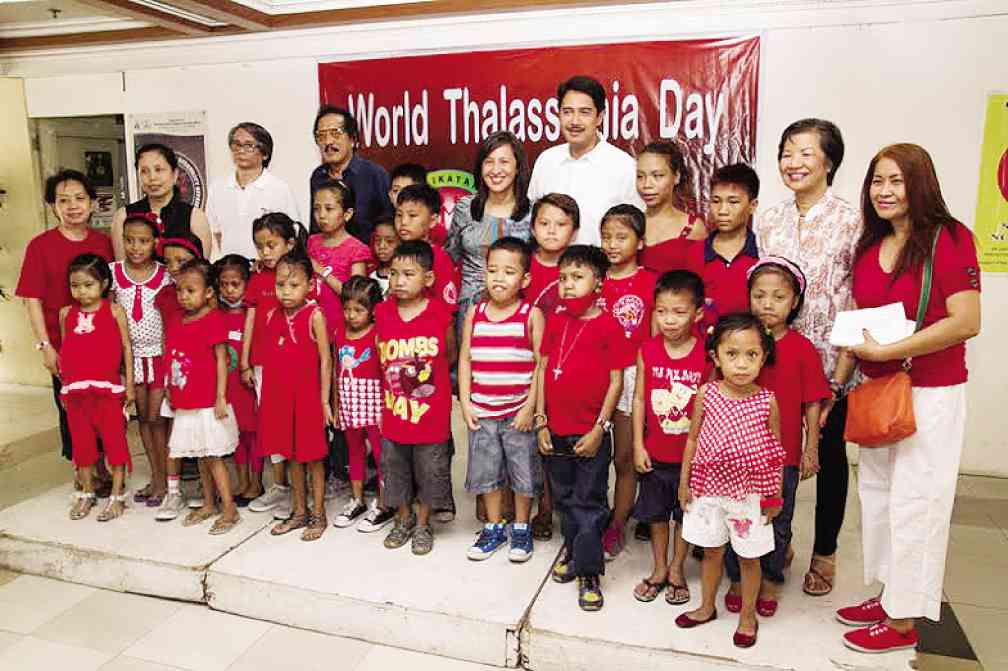
PARTNERING with Novartis Healthcare Philippines, patient support group Balikatang Thalassemia (Ba-Tha) and the Quezon City health department led the observance of World Thalassemia Day last May 8 at the QC City hall. With thalassemia patients are (back row, from left) Ba-Tha chair for patient support programs Marlyn Deocareza, Ba-Tha secretary Dr. Ma. Liza Naranjo, Ba-Tha chair of board of trustees Abel Silva, Ba-Tha president Domingo de Guzman, QC Vice Mayor Joy Belmonte and Rep. Bolet Banal, QC City health officer Dr. Antonieta Inumerable and Ba-Tha volunteer Thelma Barnuevo.
Charles Famini, a 12-year-old with thalassemia, had to ask for help to help mitigate its burden, which will afflict him for the rest of his life.
Diagnosed with thalassemia when he was around 3-5 months old, Charles had to endure a monthly blood transfusion, which can be life-threatening at times, and takes in medicine and supplements, which costs his family P35,000 to P40,000.
That is why Balikatang Thalassemia (Ba-Tha)—an organization founded in 1993 by Doctors Alendry P. Caviles Jr. and Ernesto d’ J Yuson, and families of thalassemia patients which aims to create public awareness on thalassemia and uplift the quality of care for thalassemia patients in the country—is asking the government to step in and set up a National Thalassemia Program to address the specialized needs of Filipinos with thalassemia.
Ba-Tha made that call during the observation of World Thalassemia Day last May 8 at the Quezon City Hall, which was highlighted by the oath-taking of Quezon City government health workers who were trained as “Thalassemia Champions.” Partners in the private and public sectors Novartis Healthcare Philippines and the Philippines Charity Sweepstakes Office (PCSO) were on hand to show their support for patient support group’s efforts.
“It is every thalassemia patient’s right to get support from the government [in terms of blood transfusions, medicine and other needs] because they aren’t that different from people with other diseases,” Ba-Tha secretary Dr. Ma. Liza Naranjo said.
Meanwhile Dr. Antonieta Inumerable of the Quezon City health department said they are “privileged to contribute in the provision of appropriate monitoring and treatment for Filipino patients with thalassemia in our communities.” She also called on other stakeholders “to join in the fight against this blood disorder.”
Burden of thalassemia
Thalassemia is a blood-related disorder which involves the absence of or errors in genes responsible for the production of hemoglobin, the protein in the red blood cells which carries oxygen, leading to anemia. Complications include iron overload, bone deformities and cardiovascular disease. In many regions, the disease is of such magnitude that it represents a major public health concern.
Elisa Famini, Charles’ grandmother, recounted her grandchild’s struggle with the disease. “We would bring him to Dr. Fe del Mundo Medical Center in Banawe, Quezon City, monthly for him to have a blood transfusion.” Periodic episodes of pain caused by side effects of the blood transfusions would take a toll on Charles’ studies, Elisa added. “He had to be taken to the hospital when his belly swelled too big recently.”
Thus for Naranjo, it is very fortunate that Quezon City has taken notice of their advocacy and hopes that, eventually, other cities will too. “We’re starting to get the ball rolling on this, for the public to hear about thalassemia and the needs of people afflicted with it.”
To counter critics who say that those with the disease are only few in numbers, Naranjo pointed out that thalassemia is underdiagnosed in the country. “In the first place, there is no screening [for the disease]. We don’t have a clear data on the numbers since cases aren’t well documented, even though our region is part of the WHO’s so-called ‘Thalassemia Belt.’” The Mediterranean, some parts of North and West Africa, the Middle East and parts of east and southeast Asia have a higher outbreak rate of the disease and thus comprise the “Belt.” she added that many of thalassemia patients present that day are not even from Quezon City. “Some are from Manila, Cavite, Caloocan and even Pampanga,” she said, adding that Charles, in fact, is from Caloocan.
Patient support
When the government establishes a national program, said Naranjo, it will usher in support for what she calls the ABCDs of the Thalassemia Alphabet, which are: assessment—provision of reliable, accessible, affordable thalassemia screening for families and communities; blood—assurance to safe, affordable and accessible leukoreduced red blood cells for transfusion-dependent thalassemics; chelation—provision of affordable iron chelators to patients with iron overload; and diagnostics—regular monitoring for end organ damage due to iron overload; hepatitis B and C screening.
For its part, Ba-Tha seeks to continuously educate thalassemia patients, encourage and support its members to take an active role, and empower each other to fight against public ignorance and prejudice by organizing lay forums, media guesting of thalassemia patients and other activities to increase awareness on thalassemia screening, strengthen blood donations and improve iron chelation, or the drug therapy to remove excess iron in the blood, assistance.
The group has partnered with Novartis to launch the ONCOURAGE Health Information Advocacy, which aims to promote public awareness and continuing medical education on the prevention, detection and management of cancer and blood disorder. Ba-Tha and Novartis collaborated with the PCSO, the Philippine Society of Medical Oncology, the Philippine Society of Hematology and Blood Transfusion, Philippine Foundation for Breast Care-Kasuso and Touched by Max Philippines for this effort.